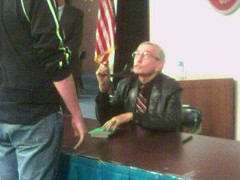I had a funny little encounter with "arguably the greatest living playwright," as I called him in today's Free-Times. Edward Albee was speaking this evening at the University of South Carolina's Fall Festival of writers, and he had some issues with what I wrote.
The nub of the matter was the following paragraph:
"Albee is known as an innovator who never stops pushing the envelope, and can be meticulous about how his plays are performed – or even if they are. Columbia’s own Trustus Theatre found that out last spring, when Albee shut down its production of his Tony Award-winning play The Goat or Who is Sylvia? after only three days. (The playwright, who had contractual approval over casting, didn’t think certain actors were tall enough, said Trustus co-founder and artistic director Jim Thigpen.)"
Thigpen's comments came by way of a friendly phone interview last week, in which he said some other things I had no room to print, and now wish I had. (That's another issue altogether -- the week-long fight I've had with the Free Times over space for the Fall Festival story, which started out as 500 words and blossomed into two stories.) Thigpen also said he greatly admired Albee and that Albee was fully within his rights -- even if it did cost Trustus $20,000 in lost revenue.
Although I normally avoid readings like the plague, I decided to attend the Albee one because he had been something of a hero to me back in junior high and high school, when I read his plays over and over, and later, too, when I directed a production of "The American Dream" for a small local theatre (about which I mainly recall that I couldn't get the lead actress to do as the play demanded and take her dress off.)
After being typically praised to the skies by one introductory speaker after the next, Albee takes the podium. The first thing he says, pulling a clipping from his pocket, is that he wishes to alert the audience to a fascinating bit of misinformation in "the free newspaper."
He reads the offending quote, doing an extended slow burn after spitting out the words "tall enough." He can't let this stand, he says, and that there was more to it than that -- although even by his own description height did seem to be the main issue, in that the theatre had cast a very tall young man as the son of two parents of average height. He also said the theatre had proceeded without a contract, and that professional theatres are supposed to act professionally. "End of grump," he said, to loving applause.
His talk was interesting, lucid, paranoid and self-serving in the standard ways you expect from writers addressing the state of the arts in America. His main beef was that no one is educated, and because no one is educated they can't stand real, painful in-your-face drama, that artists hold a mirror up to life and if you don't like what you see then you're the problem, etc. He also thinks "all great art is corrective," which says more about his tastes than it does about art. During Q. and A. time someone asked him if it was true that he had actually intended Virginia Woolf to be played by four men. He said no, and blamed the rumor in part on Stanley Kauffmann, who was the New York Times' drama critic back in the 1960s, and whom Albee apparently loathes to this day. He said something to the effect that Kauffmann probably was someone the Times took off the tennis beat to cover theatre, and that Kauffman had blamed Albee, Tennessee Williams and William Inge for the state of modern theatre, because they wrote plays about heterosexual relationships that were "really" about being gay -- which of course is what people also say about Proust.
I bought copies of The Zoo Story and Virginia Woolf? for Albee to sign, and told him I was the author of the Free Times article had given him such distress. "You made me the heavy!" he said.
Had I? Because I said he was "meticulous"? Or because I said "arguably"? Anyway, I ended the meeting by kissing his ass and telling him I admired him and he said thanks with the air of someone who is used to hearing it.
End of grump.

No comments:
Post a Comment